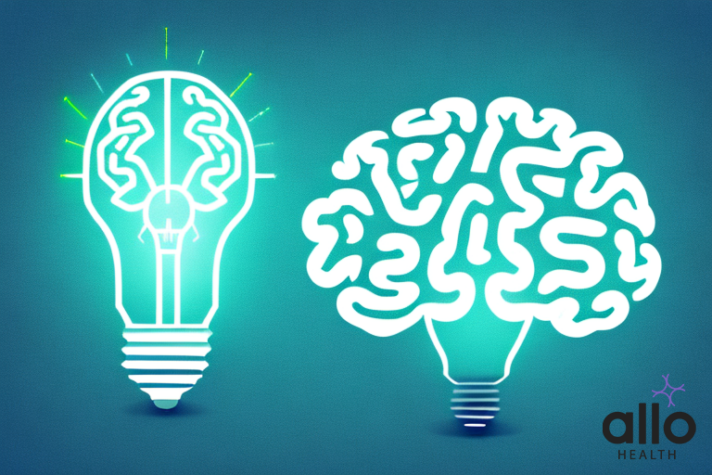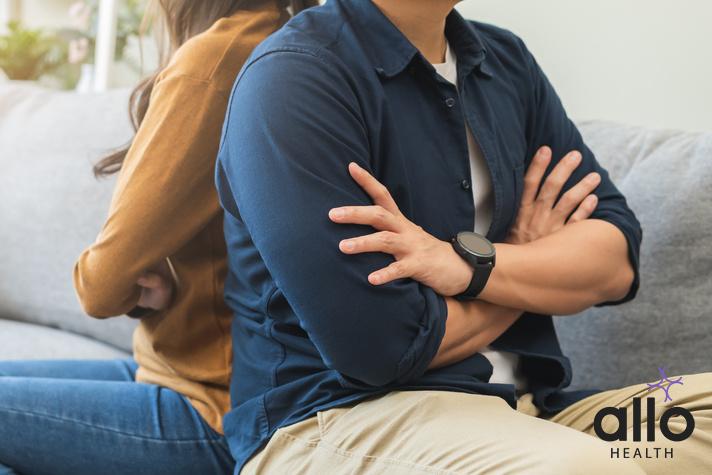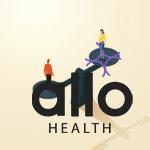Why Do People Lose Interest After Ejaculation?

Allo Health is dedicated to personalized well-being, offering support and trusted information tailored to individual health goals. The platform emphasizes human-generated content, led by a distinguished medical team of experts, including physicians and sexual health specialists. Their commitment to credibility involves rigorous fact-checking, authoritative research, and continuous updates to ensure accurate, up-to-date information. Allo Health's unique approach goes beyond conventional platforms, providing expert-led insights and a continuous commitment to excellence, with user feedback playing a crucial role in shaping the platform's authoritative voice.

Dr. Aditi completed her undergraduate medical education at AJIMS, Mangalore, after which she worked in multi-speciality hospitals with COVID patients and in the Pain and Palliative medicine department. Driven by her experiences, she developed a keen interest in psychiatry. Dr. Aditi believes that mental health is just as, if not more important, than physical health.
Why This Was Upated?
Our experts continually monitor the health and wellness space, and we update our articles when new information became available.
Updated on 04 June, 2024
- Article was updated as part of our commitment to diversity, equity, and inclusion.

"The following blog article provides general information and insights on various topics. However, it is important to note that the information presented is not intended as professional advice in any specific field or area. The content of this blog is for general educational and informational purposes only.
Book consultation
The content should not be interpreted as endorsement, recommendation, or guarantee of any product, service, or information mentioned. Readers are solely responsible for the decisions and actions they take based on the information provided in this blog. It is essential to exercise individual judgment, critical thinking, and personal responsibility when applying or implementing any information or suggestions discussed in the blog."
In the intricate dance of human sexuality, a peculiar phenomenon often takes centre stage: the seemingly abrupt loss of interest after ejaculation. This post-coital shift in attention and desire is a universal experience, particularly among males, yet it remains a topic shrouded in curiosity and speculation.
Delving into the realms of biology, psychology, and culture, this article aims to unravel the enigma surrounding why individuals often find themselves losing interest in the wake of sexual climax. By exploring the interplay of neurotransmitters, hormones, evolutionary pressures, and societal expectations, we seek to shed light on the nuanced factors that contribute to this intriguing facet of human behaviour.
The Refractory Period and Sexual Stimulation
- Definition of Refractory Period:
- The refractory period refers to the recovery time the body requires after orgasm.
- Individual Variability:
- The duration of the refractory period varies from person to person.
- Factors influencing this variability include age, health condition, and overall sexual health.
- Factors Influencing Refractory Period:
- Age: Younger individuals typically have shorter refractory periods.
- Health Condition: Physical health issues may prolong the refractory period.
- Sexual Health: Overall sexual well-being can impact the length of the refractory period.
- Impact on Sexual Stimulation:
- During the refractory period, further sexual stimulation may be less effective.
- This period contributes to the overall sexual response cycle and influences sexual satisfaction.
- Complexities of Sexual Desire:
- Understanding the refractory period is crucial for unravelling the complexities of sexual desire.
- Emotional and physiological factors interplay during this recovery phase.
- Individual Recovery Time:
- The time it takes for an individual to transition from orgasm back to a state of sexual responsiveness varies.
- Frequency of Sexual Encounters:
- The refractory period can influence the frequency of sexual activity within a given timeframe.
- Emotional and Physical Aspects:
- Beyond the physiological aspects, the refractory period involves emotional and physical recovery.
- Emotional intimacy and communication become essential during this phase.
- Coping Strategies:
- Couples may explore coping strategies to manage and optimize the refractory period.
- Open communication about desires and expectations can enhance overall sexual satisfaction.

Cardiovascular Health and Blood Pressure
- Cardiovascular Health Overview:
- Cardiovascular health pertains to the well-being of the heart and blood vessels.
- It plays a crucial role in overall health and can impact various bodily functions, including sexual health.
- Blood Pressure and Sexual Function:
- High blood pressure can affect blood flow to vital organs, including those involved in sexual activity.
- Medications used to manage blood pressure may influence sexual function, including erectile function.
- Erectile Dysfunction Medications:
- Medications designed for erectile dysfunction often target blood flow, addressing issues related to cardiovascular health.
- Sildenafil citrate, for example, enhances blood flow to facilitate and maintain erections.
- Detumescence Time:
- Detumescence time, the duration for the penis to return to a flaccid state after ejaculation, can be influenced by cardiovascular health.
- Effective blood flow is essential for a timely return to a non-aroused state.
- Blood Pressure Medications:
- Medications prescribed for blood pressure management may impact sexual health by affecting blood vessels and circulation.
- Healthy Blood Flow:
- Maintaining healthy blood flow is vital for overall well-being and contributes to optimal sexual function.
- Impact on Sexual Stimulation:
- Cardiovascular health influences the body’s response to sexual stimulation.
- Poor cardiovascular health may contribute to difficulties in arousal and sexual satisfaction.
- Lifestyle and Cardiovascular Health:
- Adopting a healthy lifestyle, including regular exercise and a balanced diet, supports cardiovascular health.
- Positive lifestyle choices contribute to improved blood flow, potentially enhancing sexual function.
- Consulting Healthcare Professionals:
- Individuals with concerns about cardiovascular health and its impact on sexual function should seek advice from healthcare professionals.
- Regular check-ups and discussions about medication side effects can aid in maintaining overall health.

Orgasmic Prolactin Increase and its Impact
- Prolactin and its Role:
- Prolactin is a hormone responsible for various functions, including milk production in women.
- Post orgasm, there is a temporary increase in prolactin levels in both men and women.
- Orgasmic Prolactin Increase:
- The surge in prolactin post-orgasm is referred to as orgasmic prolactin increase.
- This hormonal shift is a natural part of the sexual response cycle.
- Prolactin’s Impact on Refractory Period:
- Elevated prolactin levels are associated with the refractory period.
- Prolactin may contribute to the temporary decrease in sexual responsiveness immediately after orgasm.
- Influence on Sexual Responsiveness:
- Post-orgasmic prolactin increase can affect the speed at which an individual becomes sexually responsive again.
- This hormonal fluctuation is part of the intricate balance in sexual function.
- Connection to Emotional Bonding:
- Prolactin is not only involved in physiological responses but also plays a role in emotional bonding.
- Increased prolactin levels post-orgasm may contribute to a sense of emotional closeness.
- Individual Variability:
- The extent of orgasmic prolactin increase can vary among individuals.
- Factors such as age, health, and overall sexual well-being can influence this variation.
- Post-Orgasmic Prolactin and Sexual Satisfaction:
- Understanding the impact of prolactin on the post-orgasmic state is crucial for comprehending sexual satisfaction.
- The interplay between hormones and emotional states contributes to the overall sexual experience.
- Role in Reproductive Health:
- Prolactin’s involvement in reproductive health extends beyond the immediate post-orgasmic period.
- In women, it plays a crucial role in regulating menstrual cycles and fertility.
- Medical Considerations:
- Individuals experiencing persistent disruptions in sexual function or concerns related to prolactin levels should consult healthcare professionals.
- Medical interventions may be considered based on the specific circumstances and health conditions.
- Balancing Hormonal Responses:
- The body’s hormonal responses, including prolactin release, are part of a delicate balance.
- Achieving a balance in hormonal fluctuations contributes to a healthy and satisfying sexual life.

Hormonal Responses and Desire for Sex
- Hormonal Responses Overview:
- Hormonal responses play a pivotal role in regulating various aspects of human physiology, including sexual function.
- These responses are part of the intricate interplay between the endocrine system and sexual desire.
- Key Hormones in Sexual Response:
- Testosterone, estrogen, progesterone, and prolactin are key hormones influencing sexual responses.
- Their levels fluctuate throughout the sexual response cycle.
- Testosterone Levels and Sexual Desire:
- Testosterone, often considered a “sex hormone,” contributes to the maintenance of sexual desire in both men and women.
- Fluctuations in testosterone levels can impact the intensity of sexual desire.
- Connection Between Dopamine Levels and Desire:
- Dopamine, a neurotransmitter associated with pleasure and reward, plays a role in sexual desire.
- Increased dopamine levels are linked to heightened sexual motivation and interest.
- Resolution Stage in Sexual Response Cycle:
- The resolution stage, following orgasm, involves a return to baseline hormonal levels.
- Hormonal shifts during this stage influence the desire for subsequent sexual activity.
- Empowering Responses in Hormonal Fluctuations:
- Understanding and embracing natural hormonal fluctuations can empower individuals to navigate changes in sexual desire.
- Recognizing that hormonal responses are part of a dynamic process contributes to a healthier perspective on sexual health.
- Four-Part Sexual Response Cycle and Hormonal Changes:
- The sexual response cycle comprises excitement, plateau, orgasm, and resolution stages.
- Each stage involves distinct hormonal changes that collectively influence sexual desire and satisfaction.
- Physical and Non-Physical Attraction:
- Hormonal responses contribute to both physical and non-physical aspects of attraction.
- Emotional connections and intimacy play a crucial role in sustaining desire beyond physical attraction.
- Factor of Testosterone Decline:
- Age-related declines in testosterone levels, particularly in ageing men, may contribute to a decrease in sexual desire.
- Hormone replacement therapy is sometimes considered to address testosterone deficiency.
- Non-Physical Aspects of Attraction:
- Beyond physical appearance, hormones influence the emotional and psychological aspects of attraction.
- Non-physical attraction is equally important in sustaining long-term desire.
- Psychological Effects of Hormonal Changes:
- Hormonal fluctuations can have psychological effects, influencing mood and overall well-being.
- Recognizing and addressing psychological aspects is integral to maintaining a healthy desire for sex.
- Balancing Hormonal Responses:
- Achieving a balance in hormonal responses involves considering lifestyle factors, stress management, and overall health.
- Hormonal balance contributes to a more consistent and satisfying desire for sex.
Summary
The intricacies of post-ejaculatory interest decline involve a myriad of factors, ranging from physiological responses to emotional dynamics within relationships. Acknowledging these factors and their interconnectedness can lead to a more comprehensive understanding of sexual health.
Seeking professional advice and adopting a holistic approach to lifestyle, including maintaining cardiovascular health and healthy body weight, can contribute to a fulfilling and meaningful sexual life. As we navigate the delicate balance between physical and emotional attraction, it becomes clear that addressing the multifaceted aspects of sexual health is essential for a satisfying and sustainable future relationship.






































